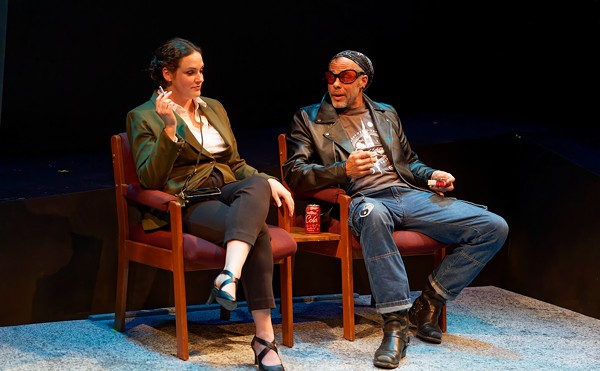Surely you remember the plot from the 1996 movie of the same title: In a desperate reach for the brass ring, six unemployed losers decide to stage a male strip show. But how to proceed? These six know nothing about presentation, poise, precision. A chorus line they're not.
Up to this point, the original film and its stage adaptation pretty much share the same scenario. But here is the moment when adaptation ceases to be a clone and becomes an entity. The movie didn't know from basketball. But onstage, the ringleader gets the brainstorm that the guys should emulate Michael Jordan. As these six hapless would-be strippers attain the first flush of grace while playing air ball and a rim-shot drumbeat allows the viewer to follow a bouncing ball that does not exist, musical-theater magic is made.
There's a lot of magic in The Full Monty, and much of it is a result of the witty, idiosyncratic music score written by a heretofore-unknown rock composer named David Yazbek. From the moment the edgy, jazzy overture begins, there's a sense that this rocker is not composing in conventional Broadway-musical terms. Yet he is. For Yazbek has admitted that he is a closet Frank Loesser junkie. All his life, his secret goal has been to write music in the vein of Guys and Dolls. Imagine Sky Masterson hurling dice to the beat of Led Zeppelin, and you have a sense of Yazbek's Full Monty score.
His music is not as melodic as Loesser's; you're not likely to leave the theater humming. But without Yazbek's ever-witty, always-irreverent, sometimes-raunchy lyrics, these characters would be little more than self-pitying, booze-slurping boors. Instead, they are endearing guys, each and every one. Not only does this score move the action forward and reveal character, but it constantly surprises.
One song, "Big-Ass Rock," lists the various ways in which a person might commit suicide -- which is hardly a subject for humor, except that it's riotously funny here. In another song, "You Rule My World," one of the men is in bed with his wife. He tenderly croons a ballad that begins, "Look at you, you're lying there/I feel your milky skin, caress your silky hair." Then the viewer realizes that the husband is singing not to his sleeping spouse, but to his own beer belly, which gives him feelings of inferiority. This is theater music put to inventive use.
The versatile score is augmented by an equally impressive book by Terrence McNally, who wisely moved the locale from Sheffield, England, to Buffalo, New York, and then jettisoned nearly the entire film script. Not more than a dozen lines have survived the transfer. Yet McNally has preserved the original story's underlying spine, which has nothing to do with stripping but everything to do with the empowerment that comes from self-esteem.
It would be hard to improve on the cast on display at the Fox Theatre. Christian Anderson as the divorcé who is on the brink of losing visitation rights to his son; Michael J. Todaro as the overweight househusband; Milton Craig Nealy as Horse, whose physical dimensions don't quite measure up to the stereotypical expectations of a "Big Black Man" (another show-stopping song, performed with deft assurance); Leo Daignault as the mama's boy who can't even commit suicide properly; and Christopher J. Hanke as a Donald O'Connor wannabe -- they're all sensationally good.
St. Louis theatergoers might recognize the group's final member. Robert Westenberg, who portrayed Henry Higgins in My Fair Lady two summers ago at the Muny, is ideally cast as the efficiency expert who fired the other five mill workers before being sacked himself. Praise, too, to Christine Hudman as Westenberg's flashy wife. Hudman brings pizzazz and sensitivity to what might have been a one-dimensional role. As the group's crusty piano-playing accompanist, 78-year-old Jane Connell sings a clever solo in which every syllable is enunciated with crystal clarity. There are no acoustical problems when Connell is onstage.
One caveat: The contrived plot roadblocks in the evening's final scenes are needless detours in a story that instead should be rushing to its inevitable and much-anticipated climax. Apart from that, The Full Monty has everything going for it -- except timing. The show's creators made one essential mistake: They opened in New York in the same season as The Producers. At least this musical had the good sense to open first. But the minute the Mel Brooks juggernaut arrived, The Full Monty became yesterday's news.
That's a shame, because this brash, rambunctious and savvily crafted entertainment is worthy of attention. As that anachronism known as "the Broadway musical" declines in both quality and quantity, offerings as skillfully wrought as The Full Monty should be cherished as an endangered species.





